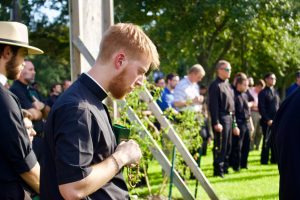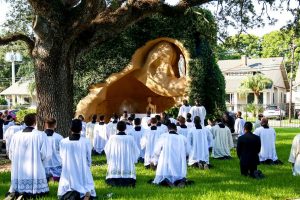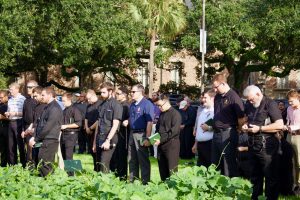From the Notre Dame Seminary Formation Handbook
340. One of the most challenging questions of the New Testament is that which Jesus addressed to the disciples when he said: “Who do you say that I am?” (Matthew 16:15). Elsewhere in the Gospel, Jesus asks: “Can you drink of the cup I am to drink of?” (Matthew 20:22). Jesus also told his disciples to “be made perfect as your heavenly Father is perfect” (Matthew 5:48). These questions and statements required a lifetime for the disciples to understand and answer. Yet these questions are essential ones for anyone who is called a disciple of Jesus. They form the foundation of what has traditionally been called “conversion,” and conversion is the goal of spiritual formation.
341. The seminary community is a real ecclesial community in the life of the Church. Each seminarian, while a member of his home parish, practices his Catholic Faith in the context of the seminary community. Moreover, the priestly formation program challenges each seminarian to cultivate a diocesan priestly spirituality. In one sense, this goal is a lifelong process yet there are certain measurable achievements, both internally and externally, that demonstrate a true priestly spirituality (cf. PPF 109-110).
342. Founded upon a personal faith, Christ urged his disciples to “…go therefore and make disciples of all nations…” (Matthew 28:19). This command binds each disciple to a commitment of evangelization. This commitment forms the indispensable context of one’s ongoing conversion. As one shares faith, one experiences anew its depth and richness.
343. Conversion is a lifelong process that has many dimensions. The role of the Spiritual Director is to facilitate one’s ever more intense conversion to Christ. The Spiritual Director enables a person to formulate and examine the questions related to this conversion and to answer them honestly in the light of experience. The Spiritual Director assists a person to establish a personal spirituality that resounds with the authentic teaching of the Church and to integrate the spiritual, human, intellectual, and pastoral pillars of formation.
Purpose
344. The spiritual formation program strives to establish a foundation within the seminarian for a lifetime of priestly ministry for the Church. This foundation is an intimate relationship with the triune God, the source of all love and truth, a relationship nourished by Scripture and Tradition, celebrated in the sacraments, most particularly the Eucharist, and marked by a sincere devotion to Our Lady, the Mother of God and the Mother of the Church. To this end, the spiritual formation program challenges the seminarian to grow in loyalty to the Church, the sacrament of salvation.
345. The spiritual formation program at Notre Dame Seminary proposes basic expectations that each seminarian must strive for:
Criteria
- To live in intimate communion with God through a life of celibacy, obedience and prayer;
- To seek Christ in the faithful meditation on the Word of God and in active participation in the sacred mysteries of the Church especially in the Eucharist, the sacrament of penance, and in the Liturgy of the Hours;
- To love and revere the Blessed Virgin Mary, seeking her protection and counsel.
346. The goals of spiritual formation are summarized in Pastores Dabo Vobis (45-50) and confirmed in the Program of Priestly Formation (110).
- a) Seminarians are to be men of prayer. They will form a habit of daily personal and liturgical prayer flowing from the celebration of the Mass and the Liturgy of the Hours with prayerful meditation on the Scriptures (lectio divina) and with a filial devotion to Mary.
- b) Seminarians will incorporate into their personal spiritual lives the frequent reception of the sacrament of penance under the direction of a Spiritual Director.
- c) Seminarians will discern their call to priestly celibacy manifesting an ability to live chastely in mature relationships with other people. They are to cultivate through their spiritual formation an affective maturity and an understanding of the gift of celibacy as a stimulus to pastoral charity and love of others in ministry.
- d) Seminarians will learn and be challenged to develop a diocesan priestly spirituality with a prayer life consistent with the demands of community living, pastoral and ecclesiastical expectations, and the needs of the Church. Spiritual formation is to form in the seminarian a personality of humility and obedience so they will be men of the Church who view the needs of the Church as greater than their own.
- e) Seminarians will cultivate a spirituality of service imitating Christ, who came “to serve and not to be served,” by living a life of simplicity and virtue.
347. The criteria for spiritual formation, summarized by the Program of Priestly Formation challenges seminarians to consider cultivating the following goals:
- Commitment to a life of prayer and the ability to assist others in their spiritual growth; expectation of developing a daily holy hour;
- Abiding love for the sacramental life of the Church, especially the Holy Eucharist and penance;
- A loving knowledge of the Word of God and a prayerful familiarity with that Word;
- Appreciation of and commitment to the Liturgy of the Hours;
- Fidelity to the liturgical and spiritual program of the seminary, including the daily celebration of the Eucharist, and participation in days of reflection and retreats;
- Fidelity to regular spiritual direction, to regular celebration of the sacrament of penance, to meditative prayer, and to a habit of spiritual reading;
- A positive embrace of a lifelong commitment to chaste celibacy, obedience, and simplicity of life;
- A love for Jesus Christ and the Church, for the Blessed Virgin Mary and the saints; an active practice of the devotional life of the Church (adoration, rosary, etc.)
- A spirit of self-giving charity toward others.
Instruments
348. The priestly formation program at Notre Dame Seminary unifies and integrates the goals of spiritual formation in its programming. The seminary uses a number of instruments to assist the seminarian in his discernment and spiritual formation.
- Instruction from the Rector-President and faculty through conferences, courses, and occasional workshops on various topics related to priestly celibacy, obedience, prayer, and simplicity.
- The personal reflection of the seminarian, who regularly examines the disciplines of his prayer life and how he is scheduling the proper and appropriate time for prayer and reflection each day.
- Community life that develops in the seminarian a sense of diocesan priestly spirituality in light of the daily schedule which includes the celebration of Mass, Liturgy of the Hours, stations of the cross or praying the rosary, and daily adoration before the Blessed Sacrament.
- In addition to the opportunity for celebration of the sacrament of penance with the Spiritual Director, the opportunity to celebrate the sacrament with the house confessor, who hears confessions on a regular basis and coordinates outside confessors and occasional communal penance services.
- Formation advisors who serve in the external forum to observe and assist the seminarian to grow more spiritually in a lifestyle of service, simplicity, and virtue. The advisors offer feedback about general perceptions shared by both the faculty and seminarians while also challenging the seminarian to develop a spirituality consonant with the public expectations of pastoral ministry.
Goals
Spiritual Directors who serve in the internal forum and contribute to the spiritual formation of the seminarian by directing him to learn more about the spiritual patrimony of the Church with devotion to the saints, particularly Our Lady, evaluating the proper discipline needed in developing a spirituality consistent with diocesan priesthood, encouraging meditation and reflection on the Word of God contained in the sacred scriptures, and determining how the seminarian can celebrate the sacrament of penance on a regular and frequent basis.
349. The priestly formation program at Notre Dame Seminary seeks to prepare the seminarians for ordained ministry and ongoing formation after ordination. Hence seminarians completing their formation at Notre Dame Seminary ought to be men who:
- Appreciate and love the sacred liturgy of the Church
- Cultivate a Eucharistic spirituality
- Foster a regular practice of the sacrament of penance
- Are faithful in their prayer of the Liturgy of the Hours
- Can hear and receive the Word of God (lectio divina)
- Revere and love the Blessed Virgin Mary
- Have formed a habit of daily, personal meditation
- Assimilate the mystery of Christ with devotional prayer
- Understand the dimensions of an ecclesial, diocesan priestlyspirituality
- Embark on a path of simplicity, poverty, and virtue
- Grow in spousal love for the People of God in the gift of chastecelibacy
- Are forming the divine and apostolic quality of obedience
- Are developing the notion of integration of human, intellectual,and pastoral formation in their spiritual life
350. Spiritual formation in the seminary seeks to lay the foundation for men who will be ordained to the diocesan priesthood and will be given an assignment by the diocesan bishop to carry out the pastoral mission of the Church. The newly ordained priest will have cultivated in his seminary formation those habits, attitudes, practices, and disciplines which will enable him to shoulder the burdens and celebrate the joys of priestly ministry.
351. Notre Dame Seminary includes opportunities for spiritual formation and development in its regular programming and scheduling. The personal accountability of the seminarian is presumed and so he is to avail himself of all the opportunities at his disposal for discernment and formation.
Components
352. The celebration of the Mass is the source and summit of Christian life and the wellspring of priestly formation. Daily participation at Mass is expected of all seminarians. Seminarians participate in the seminary community Mass by carrying out liturgical ministries with full use of the many options and expressions that reveal the richness of the Roman Rite.
353. The Liturgy of the Hours sets the daily rhythm of prayer for all priests. Seminarians pray Morning Prayer and Evening Prayer each day as a community. Seminarians are encouraged to gather frequently to pray Night Prayer with their diocesan brothers or by hallway (PPF 117, 119).
354. The regular and frequent celebration of the Sacrament of Penance is an expectation of priestly formation and a requirement for ongoing conversion. The sacrament is scheduled for the community on a regular basis by the Director of Spiritual Formation, with outside confessors, and House Confessor. The Spiritual Director serves in the internal forum at all times. Communal celebrations of the sacrament are celebrated during the year. All seminarians are encouraged to celebrate the sacrament with their Spiritual Director (PPF 110, 120).
355. Spiritual Direction is a special opportunity for ongoing discernment, formation in prayer, and integration of personal, moral, and spiritual growth. Seminarians are required to meet with their Spiritual Directors once a month, but strongly encouraged to meet every two to three weeks. The Spiritual Director serves in the internal forum and therefore does not participate in any external forum gatherings, i.e. formation advisor meetings. At the pre-theology stage of formation, spiritual direction is critically important in the discernment process; therefore, seminarians are to approach this relationship with a most trusting attitude (PPF 110, 127-135).
356. Retreats and Days and Evenings of Reflection provide the time and place for sustained prayer, silence, and solitude necessary for men who discerning a priestly vocation. The intimate and loving relationship a disciple of the Lord has with God requires a serious approach and time for prayer. The formation program includes an annual retreat, which is usually scheduled at the beginning of the second semester. Days or evenings of reflection take place on a monthly basis (PPF 110, 122). The Director of Spiritual Formation coordinates all retreats and days and evenings of recollection.
357. Candidates for ordination to the Order of Deacon and Order of Presbyter will have a class retreat according to the Code of Canon Law and the Program of Priestly Formation. Candidates for ordination to the diaconate will take their retreat in January and candidates for ordination to the priesthood will have their retreat at the end of the spring semester.
358. Formation Conferences given each week by the Rector-President and the Formation Faculty guide the seminarians in learning the value, practice, and cultivation of celibacy, simplicity of life, obedience, and pastoral service. Additionally, the homilies given by the priest celebrant always highlight the formative elements of discernment and preparation for pastoral ministry in light of diocesan priestly spirituality (PPF 110, 122).
359. The use of Sacred Scripture is a most important component in sustaining a healthy spiritual life. Seminarians who seek to draw closer to Christ and live in intimate communion with him must draw daily nourishment from the scriptures. The prayerful meditation on the Word of God (lectio divina) is encouraged as a daily practice (PPF 110, 123).
360. In order to foster growth in personal devotion and love for the Eucharist, seminarians are encouraged to spend time in prayer before the Blessed Sacrament. The seminary provides the opportunity for Exposition of the Blessed Sacrament almost every day and on Sunday evenings as well as on other special occasions. Seminarians are encouraged to spend personal time in the chapel each day to develop the discipline of prayer and reflection (PPF 110, 116, 124).
361. Devotions are a most important aspect of diocesan priestly spirituality. Through spiritual direction and conferences, the seminarians are directed to develop a special love and devotion to Our Lady. The seminary community prays the rosary periodically as a community; in addition, the rosary is offered several times a week in English and Spanish. The rosary is offered three times a week as an optional devotion and is prayed in community weekly during the Marian months of October and May. The seminarians are also introduced to the patrimony of sacred music that honors Mary through song (PPF 110, 125). The seminarians also pray the Stations of the Cross weekly in Lent. The Divine Mercy Chaplet is offered each Friday afternoon.
362. Instruction regarding the history and theology of liturgy is provided through house courses and addressed in formation conferences. The Director of Liturgy provides suitable instruction to the seminary community.



